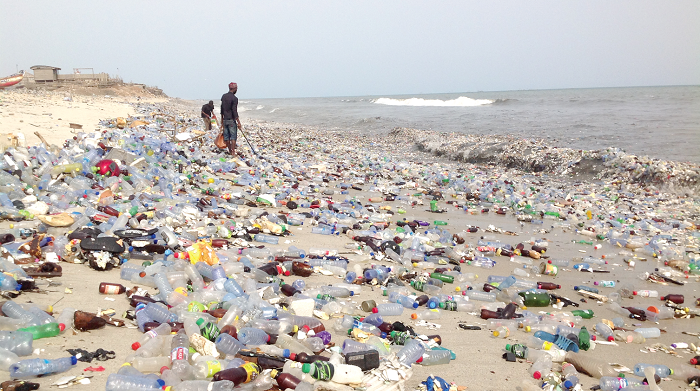Ghana's Ocean Pollution Crisis: A Ticking Time Bomb for Marine Life and Human Health

Ghana's coastline, once a pristine haven for marine life, is facing an unprecedented pollution crisis. The country's oceans are being choked by a toxic cocktail of plastic waste, oil spills, and untreated sewage, posing a significant threat to the health of both humans and marine life.
According to experts, the situation is dire. "The pollution crisis in Ghana's oceans is a ticking time bomb," said Dr. Ama Kyerewaa, a marine biologist at the University of Ghana. "If we don't take immediate action to address this issue, the consequences will be catastrophic."

The statistics are alarming. Ghana generates an estimated 0.84 million tonnes of municipal plastic waste annually, with this number increasing by 5.4% each year. This plastic waste, much of which is not biodegradable, ends up in the ocean, harming marine life and contaminating the food chain.
But plastic waste is not the only problem. Untreated sewage and wastewater from urban areas are also being released into the ocean, posing serious health risks to humans and marine life. The World Health Organization estimates that every year, over 3 million people die prematurely from water-related diseases, many of which are linked to pollution.
The economic impacts of ocean pollution are also significant. Ghana's fishing industry, which provides a livelihood for thousands of people, is being threatened by the pollution crisis. "Fishermen are struggling to make a living because the fish are disappearing," said Mr. Kofi Agorsah, a fisherman from the coastal town of Elmina. "We need the government to take action to protect our oceans and our livelihoods."
The Ghanaian government has acknowledged the severity of the problem and has pledged to take action. In 2020, the government launched the "Ghana Ocean Governance Framework," which aims to promote sustainable ocean management and reduce pollution.
However, more needs to be done. Experts are calling for increased investment in waste management infrastructure, as well as education and awareness campaigns to change behavior and reduce pollution.
As the situation continues to deteriorate, it is clear that urgent action is needed to protect Ghana's oceans and the livelihoods of those who depend on them. The future of the country's marine ecosystem hangs in the balance, and it is up to the government, civil society, and individuals to take action to prevent a catastrophe.
Source: Florence Kyei
The author is an Health & Climate Journalist and Editor at Lead News Online.
Emali: [email protected]
Linkedin: https://www.linkedin.com/in/florence-kyei-970764140
Twitter: https://x.com/evlogia_7
























































